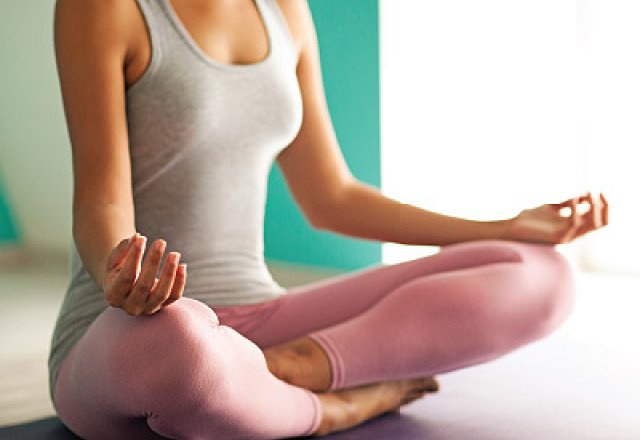
Yoga for breast cancer patients and survivors

Helps reduce stress and fatigue
According to the Breast Cancer Network Australia in 2014, an estimated 15,240 women will be diagnosed with breast cancer with a five-year survival rate of 89 per cent, indicating that many women live long and healthy lives well beyond this point.
This diagnosis can be one of the most traumatic experiences of a person’s life, affecting all aspects of health on a physical, mental, spiritual and emotional level. In January 2014, a critical study identified ways in which yoga practices support women during and post treatment to relieve symptoms such as inflammation, lethargy, poor sleeping patterns, anxiety, depression as well as general wellbeing.
Yoga is not just a practice of the physical body; the true essence of yoga has a psychosomatic and emotional effect reinforced by a range of research substantiating what yogis knew thousands of years ago, which is that yoga is a science, providing a space for healing and support at a mental, emotional and cellular level at the most challenging and traumatic times, such as breast cancer diagnosis. So just what is the latest research saying, and how exactly can yoga help?
Yoga practices for lethargy and inflammation post-treatment
One of the most common symptoms of breast cancer treatment is extreme lethargy and pain associated with increased inflammatory responses. In January 2014, the Journal of Clinical Oncology released a groundbreaking research article on the benefits of yoga for breast cancer survivors, making it the largest known randomised, controlled trial that included biological measures. The researchers chose to focus the study on breast cancer survivors as treatment is extremely exhausting and invasive.
The study evaluated yoga’s impact on mood, inflammation and fatigue in 200 breast cancer survivors, undertaking a 12-week program of 90 minutes of yoga practice twice a week. Through the use of blood tests, they identified considerable reduction of three key proteins in the blood that are markers of inflammation and tend to be high post-treatment. The ability to decrease the inflammatory response is an essential component of the management of the treatment during recovery as well as reducing the risk of secondary breast cancer.
They also discovered that the combination of yoga postures and breathing/relaxation techniques significantly reduced the stress hormone cortisol as well as cutting fatigue levels by half while boosting energy levels. Analysis showed that the consistency of yoga practice was the key in producing a greater reduction in the symptoms of fatigue, enervation and depression.
Restorative yoga practices have been well documented in the regulation of cortisol levels by increasing the function of the parasympathetic nervous system response through restorative postures and therapeutic breathing practices such as yogic breathing.
Improved quality of sleep is a crucial mechanism in the management and subsequent reduction in inflammation resulting in the capacity to engage in a more rigorous yoga practice with time.
Yoga to regulate sleep cycles and increase mood
Studies have shown that while undertaking treatment for breast cancer, fatigue and irregular sleeping cycles are prevalent, negatively impacting treatment management and survival post-treatment. Studies consistently showed that restorative yoga practices alleviated symptoms of lethargy while rebalancing sleeping cycles, particularly postures that stimulate the pineal gland, found in the brain, which produces a hormone called melatonin, responsible for balancing the sleep/wake cycles.
The pineal gland converts the neurotransmitter serotonin, found in the digestive tract and central nervous system, into the hormone melatonin, which then assists in the process of falling asleep. Interestingly, serotonin is directly linked to mood, behaviour, sleep and memory and is often associated with symptoms of depression, which can often be common in breast cancer patients.
Furthermore, a study released in September 2013 by the Journal of Clinical Oncology indicated that 30 to 90 per cent of cancer survivors reported impaired sleep quality post treatment. They believe that this high percentage is severe enough to increase the likelihood of morbidity and mortality despite the patient being in recovery. The research identified how gentle postures, breathing and meditation practices acted as a lifestyle intervention to increase sleep quality post treatment. Of the 410 survivors, of whom 75 per cent had been previously diagnosed with breast cancer, all showed greater improvements in sleep quality, more energy during the day post-sleep as well as a greater ability to awaken and feel significantly rested after sleep. Researchers also found that a combination of yoga practices significantly reduced the need for sleep medication amongst cancer survivors.
Relaxation techniques for anxiety during treatment
Mental health concerns such as higher levels of anxiety and depression can accompany the management of breast cancer, which may in turn contribute to a reduced quality of life particularly while undergoing chemotherapy and radiotherapy as well as post-treatment and during recovery.
In 2013, the International Journey of Clinical and Experimental Medicine released a research article identifying ways in which relaxation techniques and nursing care contributed to reducing symptoms of anxiety as well as other common adverse reactions for patients undergoing chemotherapy for breast cancer. This study confirmed that relaxation training received during chemotherapy contributed to reducing symptoms of anxiety particularly for patients undergoing treatment post-operatively as relaxation techniques increase the production of GABA, a neurotransmitter that aids relaxation.
Yoga practice during treatment
An individualised yoga practice or group class specifically designed to work therapeutically with breast cancer patients is considered most effective. Current research indicates that exercise during active treatment can carry a number of benefits both during and post treatment for a variety of cancers including breast cancer; however, caution must be given to intensity of the practice, frequency, duration and timing as some postures and practices are contraindicated during this time.
Studies found a consistent restorative holistic yoga practice increased emotional wellbeing during treatment and while in recovery, suggesting that yoga is an effective coping mechanism during treatment and in the transitionary process from treatment back to daily life.
Yoga for breast cancer survivors
According to a study published in 2013 by the American Journal of Health Promotion, women (at least nine months post treatment) who participated in an eight-week yoga program conducted by a yoga therapist experienced a myriad of health-promoting benefits such as increased physical, emotional and mental health. A further study published in 2012 identified that yoga practice improved the quality of life as well as emotional and social function post treatment.
The aforementioned 2014 study also identified the significant reduction in cardiorespiratory fitness caused by the debilitating treatment leading to fatigue and malaise, which in turn causes higher levels of inflammation. The high levels of fatigue and accompanied pain make it increasingly difficult for a patient to have the desire to exercise let alone the capacity; however, the study indicates that the physical aspect of yoga could in fact be a significant intervention that reduces this inflammatory response, which in turn alleviates fatigue.
A variety of significant research studies consistently indicate the need for a holistic approach in the treatment, management and recovery of breast cancer with increasing evidence showing substantial physiological improvements from a consistent, prescribed yoga practice. The journey through treatment is often a wild and unpredictable one for patients as well as their loved ones, and yoga may just be that holistic practice patients need to get them through to the ever elusive land of recovery, health and the opportunity to live life fully with vitality once more.
Emma Palmer is the principal teacher and director of the Moksha Academy of Yoga
Get more advice on yoga, meditation and health. Don't forget to let us know your thoughts on Facebook!


